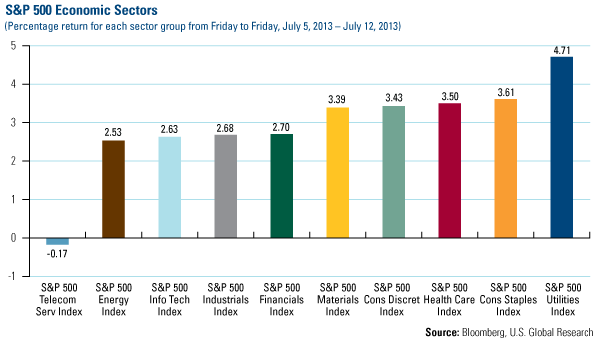U.S. Equity Market Radar (July 15, 2013)
The S&P 500 posted a strong 2.96 percent gain this week. Treasury yields fell sharply after a big run-up last week and the defensive sectors responded with utilities, consumer staples and healthcare leading the way this week. Federal Reserve Chairman Ben Bernanke appeared to soften his tone a little this week, giving the market hope that the Fed’s QE program won’t be reduced in September, as many currently expect.
Strengths
- The utility sector posted strong across-the-board returns, primarily driven by a changing interest rate outlook.
- The consumer staples sector was also a strong performer this week on broad-based strength as Walgreen, Molson Coors and Avon were particularly strong. All three names had underperformed in recent weeks and rebounded strongly this week.
- Alexion Pharmaceuticals was the best performer in the S&P 500 again this week, up 18.47 percent, as Roche Holding was rumored to be arranging financing to acquire Alexion.
Weaknesses
- Telecom services suffered the only loss on the week as Verizon Communications fell 1.73 percent. Verizon Wireless may end up owing Apple as much as $14 billion for purchase commitments on iPhones that the company hasn’t sold.
- In an otherwise strong week for most stocks, regional banks took a breather this week with the S&P 500 regional bank index falling 0.72 percent. This has been a leader in the market for the past two weeks.
- Intuitive Surgical was the worst performer in the S&P 500 for the week, falling 14.87 percent. The company preannounced significantly lower-than-expected revenue and earnings.
Opportunity
- The current macro environment remains positive as economic data remains robust enough to give investors confidence in an economic recovery, but not too strong as to force the Fed to change course in the near term.
- Money flows are likely to find their way into domestic U.S. equities and out of bonds and emerging markets, which should help the market find a floor.
Threat
- A market consolidation could continue in the near term, as macro concerns could dominate for the next couple of weeks while the market waits for earnings.
- Higher interest rates are a threat for the whole economy. The Fed must walk a fine line and the likelihood for policy error is potentially large.

















